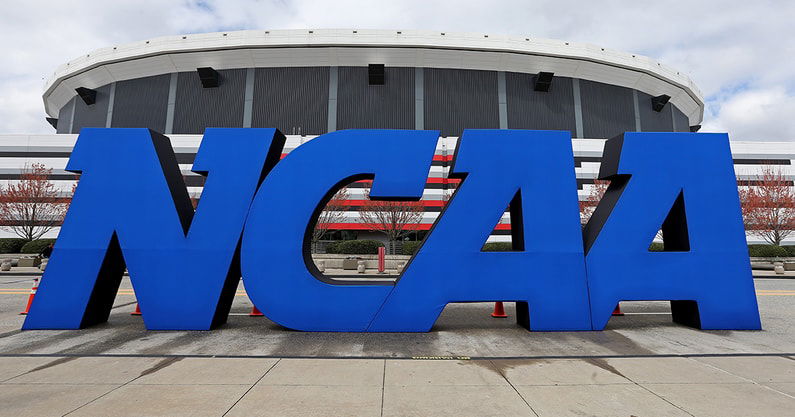
Getty
Mandatory Credits: Streeter Lecka/Getty Images

Getty
Mandatory Credits: Streeter Lecka/Getty Images
The NIL wars have officially gone nuclear. And the next few months might redefine the entire structure of college athletics. Just days after momentum built around the formation of a presidential commission on college sports, President Donald Trump, following conversations with Senator Ted Cruz—pressed pause. The White House pulled back on the idea of a federal commission, at least temporarily, to let Cruz push forward his long-gestating legislation to regulate NIL. It was a dramatic pivot in a storyline that’s already tangled in politics, power plays, and billion-dollar business interests.
Watch What’s Trending Now!
But while Capitol Hill hesitates, the Power Four conferences aren’t waiting around. As analyst John Kurtz put it, “Now, here’s the rest of the [Ross] Dellenger story. He says, ‘Power conference executives do have plans to combat such laws.'” That’s not just lip service. According to multiple insiders, the Big Ten, SEC, Big 12, and ACC are working on a draft document unlike anything college sports has seen. It aims to prevent schools from exploiting state laws that might allow them to sidestep the NCAA’s new enforcement rules.
“They’re circulating a draft of a groundbreaking and first-of-its-kind document intended to prevent universities from using state laws to violate new enforcement rules,” Kurtz said. “And it would require schools to waive their right to pursue legal challenges against the new enforcement entity.” The big stick? You sign the paper—or get out of the club. “You also cannot sue this. You can’t say, ‘Hey, we think that this enforcement entity is not legal because it’s limiting the amount of money that a student-athlete can make. So, we’re going to sue you.’ You’re waiving your right to sue. Waiving your right to use the state laws. Waiving your right to sue. That’s pretty wild,” Kurtz added.
ADVERTISEMENT
In simpler terms: it’s a legal loyalty oath to the system, even if your state, looking at you, says otherwise. “You have to sign it or we don’t play you,” one athletic director reportedly said. That’s not a bluff. It’s an existential threat to schools hoping to push the NIL envelope. At the center of the chaos is the proposed College Sports Commission (CSC), which was originally being spearheaded by Texas Tech regent Cody Campbell. The commission’s goals? Regulate NIL, provide uniform enforcement, and maybe rein in the Wild West of athlete payments.
Campbell was in recruiting mode, attempting to assemble a team of college sports leaders including Nick Saban himself. Whose private conversation with Trump in Alabama on May 1 helped spark White House interest in the first place. But while Campbell was championing a structure to support smaller conferences, Big Ten and SEC insiders viewed it differently. They saw it as a veiled move to prop up Texas Tech, the Big 12, and even Group of Five programs, potentially siphoning revenue and power from the bigger leagues.
That friction—financial and philosophical—helped stall the commission’s rollout. While NCAA president Charlie Baker and ACC commissioner Jim Phillips voiced their support for the idea, not everyone was on board. “The fact that there’s an interest on the executive side on this, I think it speaks to the fact that everybody is paying a lot of attention right now to what’s going on in college sports,” Baker said. That’s not an understatement. Behind the scenes, these leagues are building a firewall against state-level interference and testing how far schools are willing to go to stay inside the tent.
ADVERTISEMENT
Even more jarring is what’s buried deeper in the draft rules. Schools that refuse to sign wouldn’t just lose credibility—they’d lose their seat at the table. According to Dellenger’s report, “The consequence for not signing the agreement… is steep. A school risks the loss of conference membership and participation against other power league programs.” Arbitration would be the only route left for disputes. In effect, this is a full-court press—both offensive and defensive—by the conferences to seize control from individual states and protect their financial interests under the guise of uniformity.
This is the most aggressive consolidation of power college sports has ever seen.
ADVERTISEMENT
SEC shake-up: Tennessee’s NIL power play could rattle the league
Things are getting spicy in SEC country again after the Nico Iamaleava drama. A report that dropped the bombshell of powerhouse schools like Alabama, Texas, and LSU could be looking to boot some of their Tennessee-based conference rivals if they don’t fall in line with a new NIL loyalty agreement.
The issue? A bold new Tennessee law aimed at protecting schools from antitrust lawsuits over NIL payouts. While the rest of the country is trying to follow the House settlement — a massive overhaul in how athletes are compensated — Tennessee is potentially creating its own sandbox. And naturally, not everyone’s thrilled.
ADVERTISEMENT
This law would give Volunteer State programs a massive edge, letting them operate outside the same “guardrails” that schools like Bama and Texas are trying to stick to. It’s like giving Tennessee a turbo boost in recruiting wars — legally. Now, Tennessee isn’t going full rogue just yet. “The University of Tennessee has committed to following the House settlement if it is approved,” the school said in a statement. “That commitment has not changed.”
Top Stories
Chiefs Threaten Kansas Exit Over $3 Billion Dispute as Clark Hunt & Ownership Demand a ‘Landlord’ for New Stadium

Chiefs Officially Cut Ties With Super Bowl–Winning Coach as Travis Kelce Could Delay Retirement With Ex-Coach’s Return

Former Eagles & Raiders Star Found Dead Near LA Homeless Camp as Homicide Investigation Begins

Cowboys Legend Michael Irvin Breaks Silence on Controversial Allegations After Wild Belt-Whipping Celebration

Shedeur Sanders Receives Concerning Browns QB Update as Cleveland Predicted to Land Bernie Kosar ‘Regen’

Ryan Day Learns Ohio State DC’s Future After Big Cowboys News

They added a bit of a flex, too: “We appreciate the Tennessee General Assembly’s forethought in passing NIL legislation that provides future protections for student-athletes and institutions beyond the House settlement.” Tennessee’s not backing down. And the rest of the SEC? They’re not happy.
ADVERTISEMENT
ADVERTISEMENT
ADVERTISEMENT
ADVERTISEMENT



